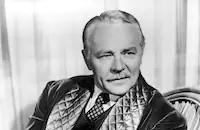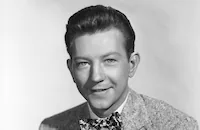Boy Trouble
Cast & Crew
George Archainbaud
Charles Ruggles
Mary Boland
Donald O'connor
Joyce Mathews
John Hartley
Film Details
Technical Specs

Synopsis
Homer C. and Sybil Fitch are set in the even tenor of their married domestic ways. Homer is a "Caspar Milquetoast" with an unhappy propensity for blundering into situations not of his making. Thinking only of her husband's happiness, Sybil thinks that she can brighten his life by providing him with a son, and thus adopts Joe, an orphan. When child-weary Homer attempts to return Joe to the orphanage, he accidentally hits Butch, another foundling, with his automobile and brings him home to recuperate, unaware that he is unharmed. Homer, who suffers daily brow beating in the Boys' Department at the store where he works, finds his peaceful home completely upset by the newcomers and orders his wife to get rid of them, having steeled his heart against showing any affection toward them. Angered by her husband's demands, Sybil decides to leave him. However, when Joe falls seriously ill with scarlet fever and the orphanage threatens to place the boy with a wealthy family, Homer finally realizes that he has come to love his two boys, and the family is reconciled.

Director
George Archainbaud
Cast

Charles Ruggles

Mary Boland

Donald O'connor
Joyce Mathews
John Hartley
Billy Lee
Andrew Tombes
Dick Elliott
Zeffie Tilbury
Sarah Edwards
Harlan Briggs
Josephine Whittell
Sonny Bupp
Georgia Caine

Russell Hicks
Grace Hayle
Charles Trowbridge
Spencer Charters
George Billings
Sonny Boy Williams
Wally Albright
Tommy Tucker
Doodles Weaver
Edgar Gargan
Pat West
Kathryn Bates
Nell Craig

Fern Emmett
Charlotte Treadway
Gloria Williams
Ethel Clayton
Paula De Cardo
Helaine Moler
Shelia Darcy
Ruth Rogers
Dorothy White
Crew
Monte Brice
Lloyd Corrigan
Hans Dreier
A. E. Freudeman
Earl Hayman
William Lebaron
Alma Ruth Macrorie
Boris Morros
Robert Odell
Richard Olson
Laura Perelman
S. J. Perelman
Henry Sharp
George Templeton
William Wright

Film Details
Technical Specs

Articles
Donald O'Connor, 1925-2003
Born Donald David Dixon O' Connor in Chicago on August 28, 1925, he was raised in an atmosphere of show business. His parents were circus trapeze artists and later vaudeville entertainers, and as soon as young Donald was old enough to walk, he was performing in a variety of dance and stunt routines all across the country. Discovered by a film scout at age 11, he made his film debut with two of his brothers in Melody for Two (1937), and was singled out for a contract by Paramount Pictures. He co-starred with Bing Crosby and Fred MacMurray in Sing, You Sinners (1938) and played juvenile roles in several films, including Huckleberry Finn in Tom Sawyer - Detective (1938) and the title character as a child in Beau Geste (1939).
As O'Connor grew into adolescence, he fared pretty well as a youthful hoofer, dancing up a storm in a string of low-budget, but engaging musicals for Universal Studios (often teamed with the equally vigorous Peggy Ryan) during World War II. Titles like What's Cookin', Get Hep to Love (both 1942), Chip Off the Old Block and Strictly in the Groove (both 1943) made for some fairly innocuous entertainment, but they went a long way in displaying O'Connor's athletic dancing and boyish charm. As an adult, O'Connor struck paydirt again when he starred opposite a talking mule (with a voice supplied by Chill Wills) in the enormously popular Francis (1949). The story about an Army private who discovers that only he can communicate with a talking army mule, proved to be a very profitable hit with kids, and Universal went on to star him in several sequels.
Yet if O'Connor had to stake his claim to cinematic greatness, it would unquestionably be his daringly acrobatic, brazenly funny turn as Cosmo Brown, Gene Kelly's sidekick in the brilliant Singin' in the Rain (1952). Although his self-choreographed routine of "Make "Em Laugh" (which includes a mind-bending series of backflips off the walls) is often singled out as the highlight, in truth, his whole performance is one of the highlights of the film. His deft comic delivery of one-liners, crazy facial expressions (just watch him lampoon the diction teacher in the glorious "Moses Supposes" bit) and exhilarating dance moves (the opening "Fit As a Fiddle" number with Kelly to name just one) throughout the film are just sheer film treats in any critic's book.
After the success of Singin' in the Rain, O'Connor proved that he had enough charisma to command his first starring vehicle, opposite Debbie Reynolds, in the cute musical I Love Melvin (1953). He also found good parts in Call Me Madam (1953), There's No Business Like Show Business (1954), and Anything Goes (1956). Unfortunately, his one attempt at a strong dramatic role, the lead in the weak biopic The Buster Keaton Story (1957) proved to be misstep, and he was panned by the critics.
By the '60s, the popularity of musicals had faded, and O'Connor spent the next several years supporting himself with many dinner theater and nightclub appearances; but just when it looked like we wouldn't see O'Connor's talent shine again on the small or big screen, he found himself in demand at the dawn of the '90s in a string of TV appearances: Murder She Wrote, Tales From the Crypt, Fraser, The Nanny; and movies: Robin Williams' toy-manufacturer father in Toys (1992), a fellow passenger in the Lemmon-Matthau comedy, Out to Sea (1997), that were as welcoming as they were heartening. Survivors include his wife, Gloria; four children, Alicia, Donna, Fred and Kevin; and four grandchildren.
by Michael T. Toole

Donald O'Connor, 1925-2003
Quotes
Trivia
Notes
The working titles were Two Weeks with Pay and Parents on Probation. This picture was the first in a proposed series of Paramount films starring Charlie Ruggles and Mary Boland as the Fitches. However, only a sequel, Night Work, was made (see below).














